Smooth Moves: Expert Tips for a Stress-Free Relocation
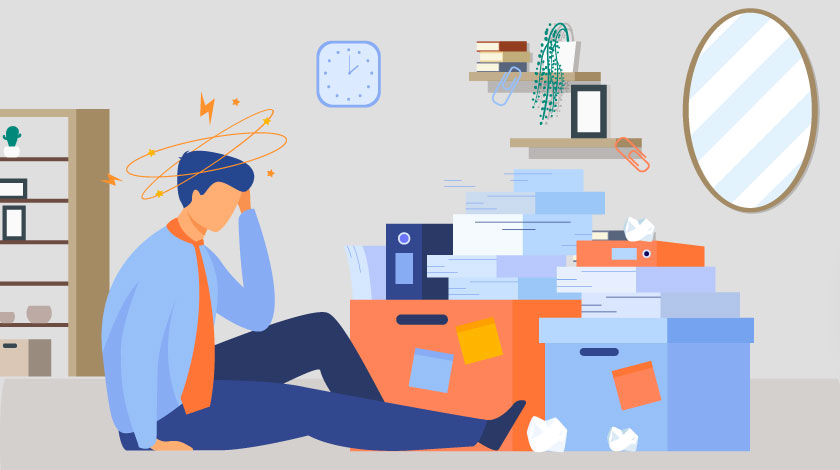
Whether it’s the logistical challenges, the emotional upheaval of leaving familiar surroundings, or the pressure of setting up a new home, each step can significantly impact one’s mental well-being.
Recognizing this, our blog today aims to offer more than just moving tips; we focus on your peace of mind. We understand that as moving professionals, we play a crucial role in easing what can be a daunting transition.
That’s why we’re dedicated to providing practical mental health strategies and relaxation techniques to make your moving process as stress-free as possible. From planning stages through to the moment you settle into your new space, we’re here to support you not just as movers but as partners in managing the emotional journey of your relocation.
Understanding the Stress of Moving
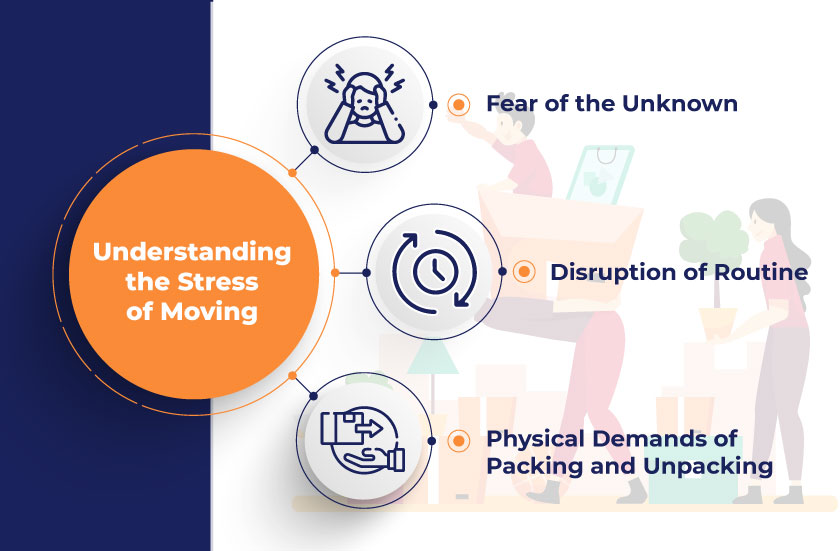
Moving to a new home is a complex process that involves significant physical and emotional challenges. Here, we explore common stressors associated with moving and their impacts on mental health:
1. Fear of the Unknown:
- Moving often brings uncertainties—new environments, neighbors, and sometimes new cultural contexts.
- Anxiety about these changes can be overwhelming, particularly as you step out of your comfort zone into unfamiliar settings.
2. Disruption of Routine:
- Our daily routines provide structure and stability, offering comfort and predictability.
- When these routines are disrupted by a move, it can lead to feelings of instability and stress, affecting individuals who rely heavily on a consistent daily schedule.
3. Physical Demands of Packing and Unpacking:
- The physical tasks of sorting, packing, transporting, and then unpacking belongings are not only time-consuming but also physically exhausting.
- This exhaustion can amplify emotional stress, making it challenging to manage tasks and emotions effectively.
Planning Tips to Reduce Stress
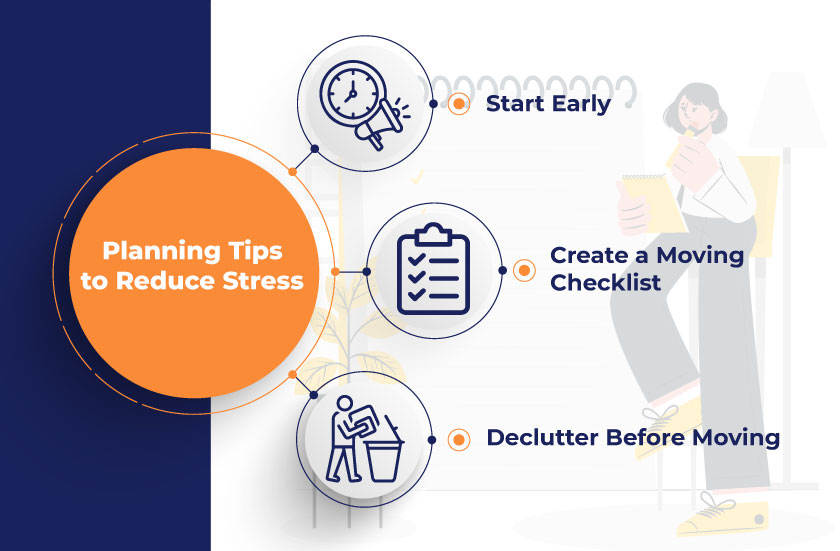
Effective planning is key to minimizing the stress associated with moving. By managing the logistics of a move in advance, you can significantly reduce the pressures that come with relocation. Here are some essential planning tips designed to streamline your moving process:
1. Start Early:
- Begin planning your move as early as possible. The more time you have to organize the logistics of your move, the less stress you'll encounter as the moving day approaches.
- Early planning allows you to address potential issues before they become urgent, reducing the likelihood of last-minute crises that can heighten anxiety and stress.
2. Create a Moving Checklist:
- Develop a comprehensive moving checklist that guides you through each phase of your move. This checklist should include key tasks such as researching and hiring movers, scheduling utility cutoffs and setups, and important dates for packing.
- A detailed checklist serves as a roadmap for the move, ensuring you don’t overlook any tasks and can methodically check off completed actions, which can provide a sense of accomplishment and control.
3. Declutter Before Moving:
- Take the time to declutter your home before you begin packing. Sort through your belongings and decide what to keep, sell, donate, or throw away.
- Decluttering simplifies the packing process, reduces the volume of items you need to move, and can also decrease moving costs.
- Additionally, starting life in a new home with only the items you truly need or love can contribute to a sense of simplicity and new beginnings.
Relaxation Techniques During the Move
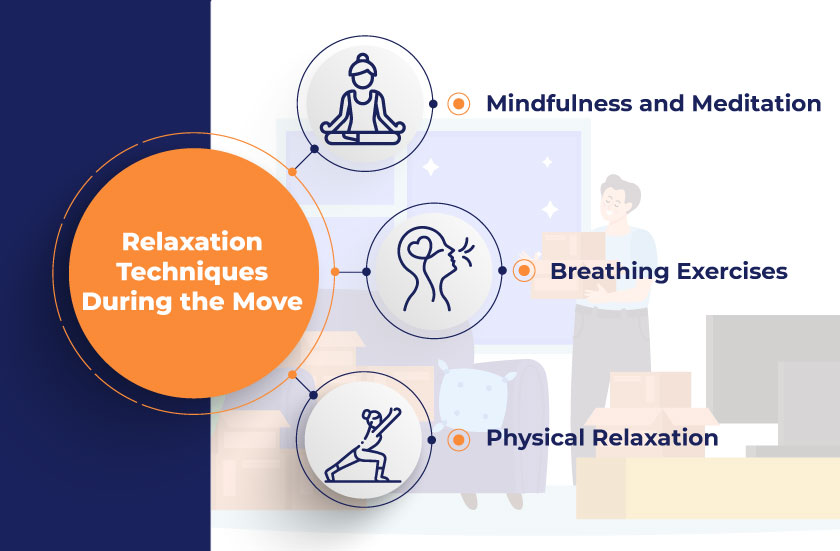
Moving day can be hectic, but incorporating relaxation techniques into your routine can greatly reduce stress levels and enhance overall well-being. Here are some effective methods to help you stay calm and centered, even amidst the chaos of relocation:
1. Mindfulness and Meditation:
- Set aside short periods during packing or moving breaks for mindfulness exercises. These can be as simple as closing your eyes for a few minutes and paying attention to your breath or the sensations in your body.
- Use guided meditations available through apps or online platforms. These guided sessions can help refocus your thoughts and reduce feelings of anxiety, bringing a moment of peace to your busy day.
2. Breathing Exercises:
- Practice deep breathing techniques to manage stress effectively. A simple method is the 4-7-8 technique, where you inhale deeply for 4 seconds, hold your breath for 7 seconds, and exhale slowly for 8 seconds. Repeat this cycle four times.
- These breathing exercises can be done anywhere and anytime you feel stress levels rising. They are particularly useful just before making decisions or dealing with moving challenges.
3. Physical Relaxation:
- Incorporate stretching or yoga poses into your moving routine to counteract the physical strain of packing and lifting. Focus on stretches that target the back, shoulders, and neck, which are areas often strained during physical tasks.
- Consider simple poses like the Cat-Cow stretch, which promotes flexibility in the spine, or the Standing Forward Bend to relieve tension in the back and legs. These exercises help maintain circulation and can prevent muscle stiffness.
How Movers Can Support Clients
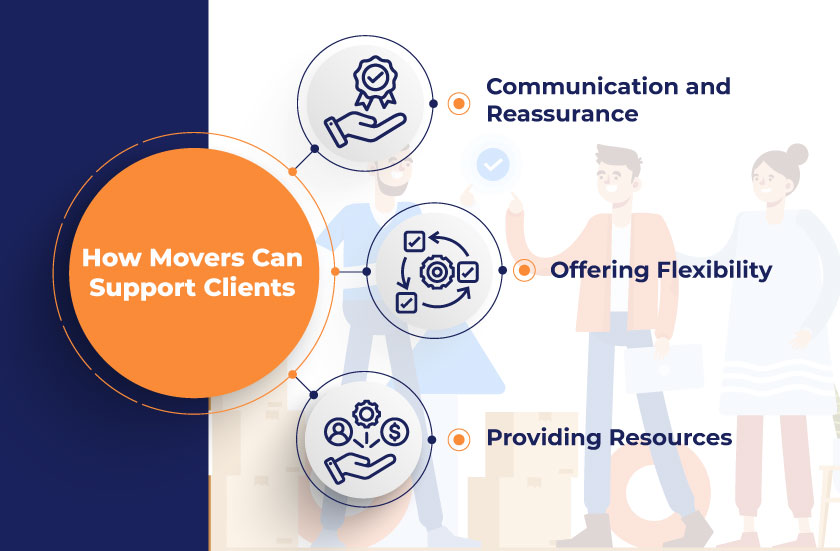
A successful move relies not just on the physical transport of items but also on the quality of service provided by movers. Movers can play a crucial role in easing the stress of moving by adopting a supportive approach that goes beyond lifting boxes. Here are some ways movers can actively support their clients’ needs throughout the relocation process:
1. Communication and Reassurance:
- Effective communication is key. Movers should maintain open lines of communication with clients from the initial contact until the job is completed. This includes timely updates about arrival times, handling requirements, and the moving process.
- Providing reassurance about the safety and care of clients’ belongings can significantly alleviate stress. Movers should ensure clients feel confident that their possessions are handled with care, using appropriate packing materials and techniques to secure items safely.
2. Offering Flexibility:
- Flexibility is essential in the moving industry. Movers should strive to accommodate last-minute changes in scheduling or specific client requests as much as possible. This flexibility can relieve a great deal of pressure on clients who may be dealing with unpredictable circumstances.
- Being able to adjust resources and schedules quickly not only increases customer satisfaction but also helps in reducing the stress associated with strict or unmanageable timelines.
3. Providing Resources:
- Movers can extend their support by offering additional resources that may help clients during their transition. For example, providing a list of local mental health resources, such as counselors and support groups, can be incredibly beneficial for clients who may find the emotional aspects of moving overwhelming.
- Partnering with professional organizers or recommending services that help with unpacking and setting up the new home can further assist clients in managing the chaos often associated with settling into a new environment.
Post-Move Tips
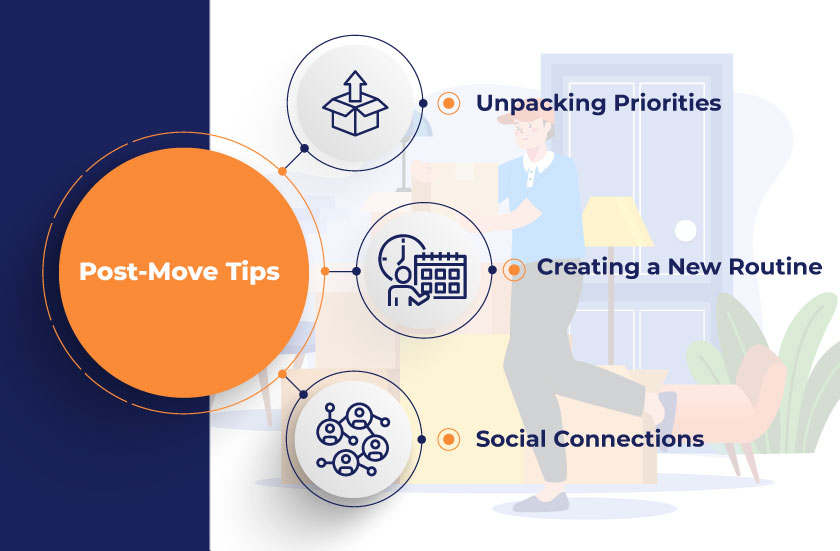
Once the moving trucks have departed and you're standing amid a sea of boxes, it might feel overwhelming to think about what comes next. However, establishing a sense of order and beginning to adapt to your new environment can greatly reduce post-move stress. Here are some tips to help you settle into your new home and community:
1. Unpacking Priorities:
- Start by setting up the rooms that are central to daily life to quickly create a sense of normalcy. The kitchen is often a good starting point, as having the ability to cook and eat meals can make the space feel more like home. Next, arrange your bedrooms, providing a restful place to end the day.
- Prioritize setting up areas that reduce the immediate clutter and allow for functional living spaces. Organizing personal items like clothing and toiletries can also diminish feelings of disarray and help reduce stress.
2. Creating a New Routine:
- Establish a new daily routine as soon as possible. Familiar routines bring comfort and can help you and your family adjust to a new environment more quickly.
- Try to maintain consistent meal times, bedtimes, and work schedules, even if the surrounding settings have changed. This consistency helps anchor your day and provides stability amidst the change.
3. Social Connections:
- Engaging with your new community can play a vital role in how quickly you adapt to your new surroundings. Attend local events, join clubs or groups that align with your interests, or participate in community gatherings to meet new people.
- For those more inclined to digital interaction, look for local community groups on social media platforms. These groups can be great resources for learning about your new area and finding social activities where you can meet neighbours and make friends.
Relocate with Ease: Keeping Calm and Carrying On
Moving is undoubtedly one of life's most challenging transitions, involving not only physical but significant emotional exertions. Throughout this blog, we've explored various strategies designed to help manage the mental strains associated with relocations, from the initial planning stages through to settling into your new environment.
The stress of moving can take a toll on anyone’s mental health, which makes it imperative to prioritize and take proactive steps towards managing stress. Remember, it's not just about moving belongings, but also about transitioning your life from one place to another.
As you plan your next move, keep these tips in mind to help navigate the complexities of relocation with less stress and more confidence. Don't hesitate to reach out for professional help if the stress becomes overwhelming. Whether it's hiring experienced movers, consulting with a mental health professional, or connecting with new community resources, support is available to ensure you move not just your belongings, but also yourself, to a happier place.